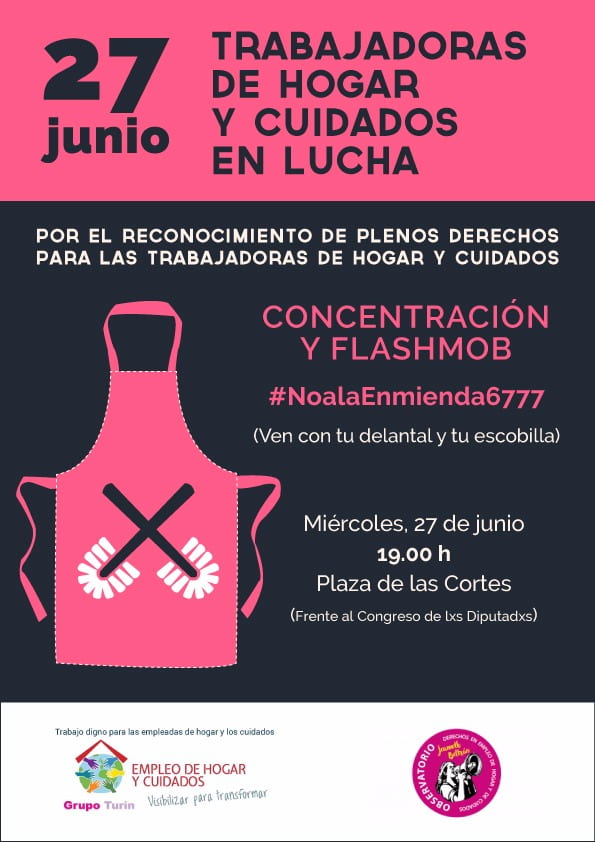Week 4
Reviewing the Field
On the afternoon of Thursday, June 27th, I had the opportunity to participate with SEDOAC in a demonstration in front of the Spanish Palace of Congress.

Under the title “Domestic Workers and Caregivers in the Fight: For the Recognition of Full Rights for Domestic Workers and Caregivers”, the demonstration aimed to revert a series of amends to the State budget made by the outgoing party, the Partido Popular (PP), right before a vote of no confidence in parliament ended their administration. With support from other parties—namely by the conservative Citizens party (Ciudadanos), the Basque Nationalist Party (PNV), and assumed by the social-democrat Partido Socialista Obrero Español (PSOE)—the PP introduced an amendment that undermined the rights of domestic workers and care workers. The hashtag for the event, #NoEnmienda6777, refers to the amendment that affects this constituency in a myriad of ways:
- Delays the equalization of Social Security contributions for this group of workers until 2024
- Excludes household employment from the solidarity system that complements contribution gaps
- Damages future pensions and contributory benefits
- Following a patriarchal logic, maintains the historical discrimination of this group in place by not recognizing the employment of domestic workers and caregivers as a job with full rights
- Continues to devalue an employment whose function is to care for people, perpetuating the dismantlement of public system of attention.
The event had nationwide coverage, with several news outlets present in the Plaza de las Cortes. Here you can see Carolina Elías, president of SEDOAC, being interviewed by Madrid Directo, a program in the Telemadrid network. Below, member of the SEDOAC board Marta Lucía Arboleda being interviewed by El País, the newspaper with the largest circulation in Spain. The day after the demonstration, El País published an article detailing the events that went down in front of Congress.
The event featured the participation of other organizations in the same vein as SEDOAC, like Colectivo Territorio Doméstico. I then found out, after taking a closer look at the poster for the demonstration, that the event was organized by Grupo Turín, a platform created in 2012 that conglomerates organizations and associations dedicated to pursue the full legal recognition of the sector of domestic workers. Grupo Turín proves to bound organizations that aspire to raise awareness of the structural difficulties experienced by domestic workers, and additionally creating solidarity linkages among individuals with like-minded aspirations in the realm of social justice.
About Grupo Turín
Created in 2012, Grupo Turín‘s main objective is to have the Spanish State ratify the 189 Convention of the International Labor Organization (“Concerning decent work for domestic workers”). Several conferences are made, as well as campaigns created to raise awareness, for this aim to be achieved. It is worth mentioning that only 22 countries have ratified this convention since its adoption by the ILO in 2011: 14 from Latin America, 7 from Europe, and 1 from Africa. Grupo Turín explains the necessity of abiding by the 189th Convention in its website (translation by the author):
The agreement and its recommendations are a matter of social justice and dignity. It is an necessary recognition of the extraordinary work of millions of female domestic workers around the world. It [the Convention] constitutes a solid recognition of the economic and social value of domestic work, and calls to action to put an end to modern exclusion and slavery, which are the object of domestic workers in the fields of social and labor protection.
Grupo Turín conglomerates a variety of organizations that seek for the 189th Convention to be ratified in Spain. Some of its affiliated organizations and associations include the following, among which we find SEDOAC:

These are some very interesting times to be in Spain! With Rajoy’s ouster and Sanchez’s promotion, the Left is rising in a way that is so at odds with the rest of the EU. I wonder what impact this will have on organizations like SEDOAC and the other groups involved with Grupo Turin, which itself seems particularly Left-leaning at least in terms of its focus on cooperatives, labor, and (do I detect?) feminism. I’ve asked Siobhan this, as well, but where do you see SEDOAC making common cause with the political parties in power? That is, is anyone in power listening to SEDOAC?
There are independent Congresswomen that keep in contact with SEDOAC and their plights. That being said, the conventional political parties–the conservative Partido Popular (PP) and the liberal Partido Socialista Obrero Español (PSOE)–tend to acquire an ambiguous rhetoric that speaks of ‘migrants’ almost as a monolith. This rhetoric negates the existence of hierarchical organization within migrants who join the Spanish labor force. For whatever reason, the narrative conveniently steers away from the additional challenges faced by migrant women, particularly those in the domestic service.